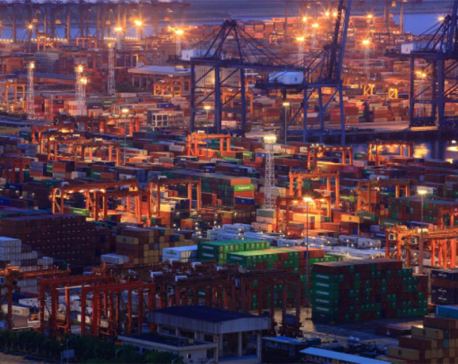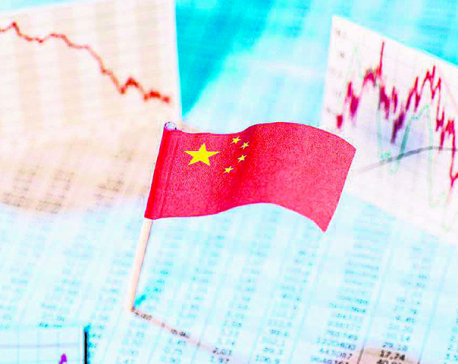
OR
Asian markets in reverse as China-US row returns to fore
Published On: August 31, 2018 11:00 AM NPT By: AFP/RSS

HONG KONG, Aug 31: Asian markets sank Friday as the China-US trade row burst back into view with a report that Donald Trump wants to impose tariffs on $200 billion of goods as early as next week.
After starting the week with three days of rallies -- fuelled by hopes for a new Canada-US-Mexico trade pact and easing Brexit fears -- investors were sent running for the hills as the row with Beijing shows no sign of letting up.
Bloomberg News said Trump wanted to tax $200 billion of goods as soon as public consultation ends next week, adding to the $50 billion already levied.
The report follows talks last week between the world's top two economies -- the first on trade since they began exchanging tit-for-tat tariffs in July -- ended with no breakthrough and will rekindle fears of a painful trade war.
Dealers were also spooked by Trump's repeated threat to leave the World Trade Organization if it does not "shape up".
"One thing's for sure ? Sino-US trade developments are destined to be the defining feature of September's markets," said Ray Attrill, head of foreign-exchange strategy at the National Australia Bank.
"We are inclined to take the headlines that Trump is minded to announce his intentions to ratchet up tariffs on China as early as next week at face value."
The latest comments come ahead of a summit between Trump and Chinese President Xi Jinping in November, with some observers saying they are part of a strategy by the tycoon to win concessions.
- Optimism takes back seat -
All three major Wall Street indexes ended down, with the S&P 500 and Nasdaq ending a streak of four straight days of records.
The losses filtered through to Asia, where Tokyo ended the morning session 0.2 percent lower, while Hong Kong sank 1.5 percent and Shanghai lost 0.9 percent. A better-than-forecast reading on Chinese manufacturing activity was unable to lift the gloom.
Sydney fell 0.3 percent, while Singapore and Seoul were each off 0.1 percent. Wellington, Taipei, Manila and Jakarta were also sharply lower.
"The optimism from earlier in the week after a fast negotiation led to the US-Mexico trade agreement and positive Brexit news are now in the rearview mirror as investors worry that global growth might be in jeopardy," Alfonso Esparza, senior currency analyst at OANDA, said.
In foreign exchanges the Indonesian rupiah hit its lowest level since the Asian financial crisis 20 years ago as financial crises in Argentina and Turkey fuel concerns about other emerging markets.
The rupiah hit 14,750 to the dollar at one point. However, Prakash Sakpal, Singapore-based economist at ING Groep NV, told Bloomberg News "things now are far different than 20 years ago when the crisis originated in Asia and rupiah?s external creditworthiness was much weaker".
The Turkish lira tumbled 1.7 percent to 6.77 to the dollar in Asia, extending this week's sell-off as a deputy central bank governor resigned, with the economy facing a possible recession made worse by US sanctions. The unit has lost about half its value this year.
High-yielding currencies are back under pressure after a brief rally against the greenback caused by dovish comments from the head of the Federal Reserve.
You May Like This

China’s global climate boost
With the American public divided and climate science politicized, rejoining the Paris accord will not by itself make the US... Read More...

China to fight back against U.S. tariff move: People's Daily
BEIJING, Aug 25: China will fight back against the latest U.S. step to increase tariffs on Chinese goods, the ruling Communist... Read More...

Art of wait and see
In the emerging Chinese view, any leverage or advantage the US has over China in trade is far exceeded by... Read More...







Just In
- NRB to provide collateral-free loans to foreign employment seekers
- NEB to publish Grade 12 results next week
- Body handover begins; Relatives remain dissatisfied with insurance, compensation amount
- NC defers its plan to join Koshi govt
- NRB to review microfinance loan interest rate
- 134 dead in floods and landslides since onset of monsoon this year
- Mahakali Irrigation Project sees only 22 percent physical progress in 18 years
- Singapore now holds world's most powerful passport; Nepal stays at 98th











Leave A Comment